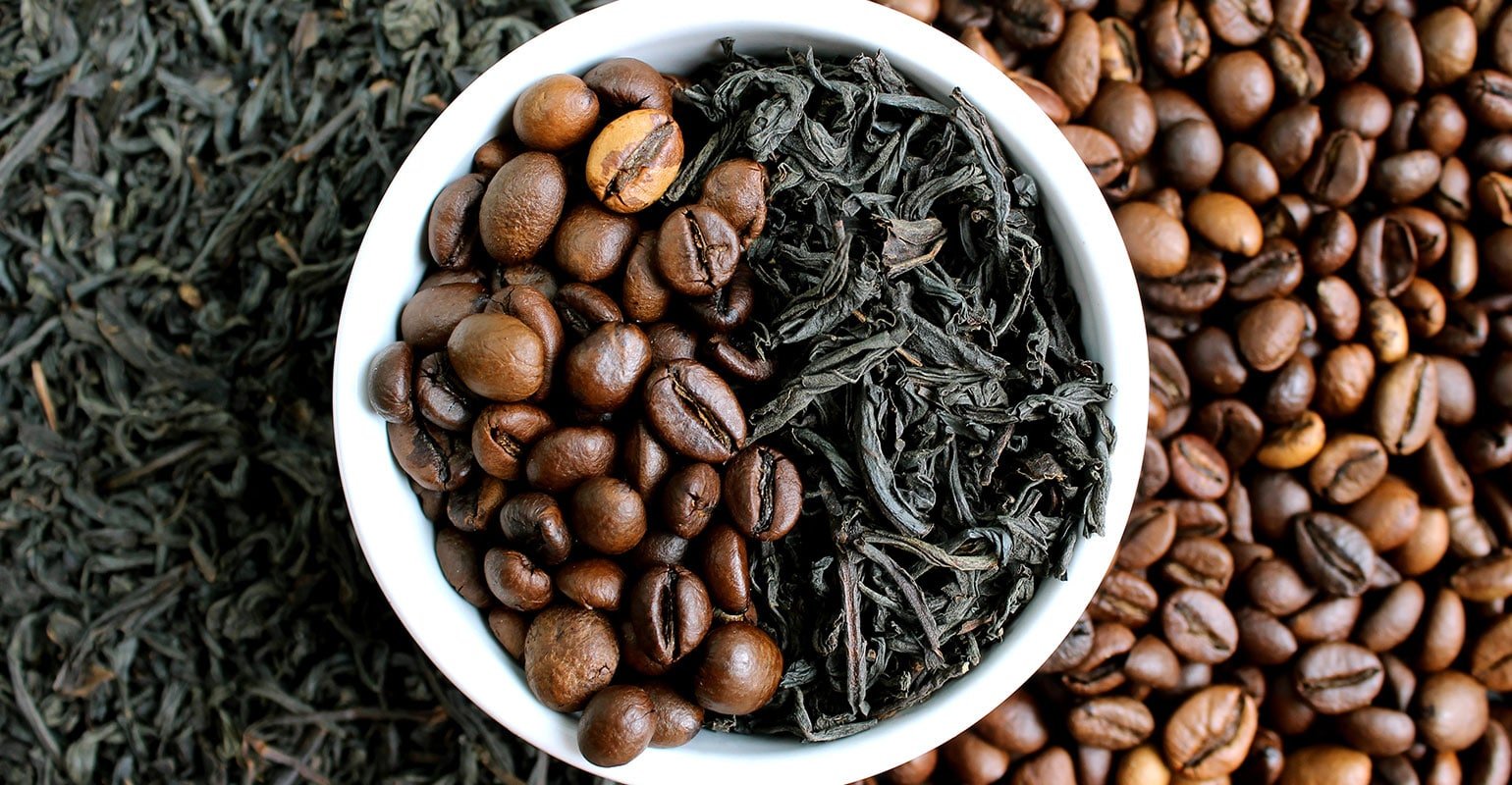
Table of Contents
Just like cats and dogs or chocolate and vanilla, tea and coffee are similarly polarising. The simple question of “which do you prefer?” can lead to long, heated debates. Each beverage has its die-hard fans who can’t get enough, and will always prefer one over the other.
A hot beverage can be delicious, soothing, or invigorating. It can act as a way to start the day, or wind down in the evenings, or even make a difficult conversation easier. But is tea or coffee better?
Of course, when it comes to taste, it truly is a matter of preference. But when it comes to which is better for your health, it’s not always so simple. Both tea and coffee boast a variety of health benefits and sometimes determining which is actually better for you can feel confusing.
Let’s compare the two products.
Caffeine
The most obvious ingredient most people are aware of in tea and coffee is caffeine. If you’ve ever found yourself reaching for your cup when you’re trying to get going in the morning or power through a long afternoon, it’s the caffeine that provides this pick me up.
Plants including tea (Camellia sinensis), coffee (Coffea arabica, Coffea canephora), cacao (Theobroma cacao), and guarana (Paullinia cupana) produce caffeine, and are used to create many caffeinated products, including your favourite hot beverage, chocolate, and energy drinks.
How does caffeine work?
Caffeine is a stimulant that works by blocking the production of adenosine, a neurotransmitter that promotes relaxation. It is a hotly debated topic when it comes to how much is too much, as caffeine can certainly boost mental alertness and has been shown to prevent type 2 diabetes, but excessive use can raise blood pressure, cause heartburn, and increase insomnia and anxiety.
Both tea and coffee naturally produce caffeine, and tea plants actually contain naturally higher levels of caffeine than coffee beans. However, the brewing and production process affects the finished product; the higher brewing temperatures used in coffee lead to more caffeine being available in your cup. Discarding the tea leaves before consumption also reduces the amount of caffeine present.
Caffeine is also an addictive substance, and withdrawal symptoms may include headaches, moodiness and jitters.
Caffeine content
On a purely mathematical level, brewed coffee is higher in caffeine. A 50 ml black espresso generally contains 150-200mg of caffeine, while 250ml of regular black tea contains only 50-70mg. With health advice from the Australian Government (1) recommending that a healthy adult have no more than 400mg of caffeine per day, this leaves you free to enjoy more cups of tea.
Caffeine can be removed from coffee beans, however, many people consider the flavour to be less appealing. By comparison, many varieties of tea, including white tea, have naturally lower caffeine levels without impacting the taste.
When it comes to calculating your caffeine intake, chocolate, energy drinks and cola drinks need to be calculated too.
Tea also contains an L-theanine, an amino acid that regulates the absorption of caffeine in your system. This gives you a more steady release and can avoid you becoming jittery with a spike in caffeine levels or crashing afterwards. In combination with caffeine, L-theanine has been shown to improve mental alertness compared to caffeine alone (2).
For people who want to increase their mental alertness without a high caffeine intake, tea can be a preferable alternative.
Other health benefits
Although most studies regarding the effects of caffeine have been conducted using coffee, research is now finding a variety of these benefits are also applicable to tea due to the presence of similar chemicals, and that certain ingredients in tea provide unique benefits.
Cancer prevention
Tea is naturally high in antioxidants, including polyphenols, particularly green tea varieties. Research into the effects of antioxidants is showing that they can reduce or prevent oxidative damage, which may be beneficial in preventing cancer (3).
Test tube studies have suggested that polyphenols may also kill cancerous cells, however, human testing has not taken place (4).
The Australian Cancer Council also notes that green tea may act as a preventative, but that further studies need to be conducted to determine the efficacy as a cancer treatment (5).
Similarly, coffee is touted to prevent cancer growth due to its antioxidant properties, but more studies are required.
Stroke prevention
A 10-year study has shown that consuming 4 cups a day of black tea may lower your risk of stroke (6). Green tea is also suggested to be beneficial with a risk reduction of 21% when 3 or more cups are consumed daily (7).
A similar study has shown that 5 cups of coffee per day may have a similar effect in preventing strokes in women (8). However, when drinking espresso, the quantity of coffee is also in excess of the safe caffeine intake guidelines determined by Australian health officials.
Type 2 diabetes
Both tea and coffee are suggested to be able to assist in the prevention of type 2 diabetes. It is believed that the caffeine content inhibits insulin resistance, although lowered risk has been observed with decaffeinated tea and coffee as well.
Green tea in particular is shown to assist type 2 diabetics in managing symptoms including weight loss and reducing blood pressure (9).
Although neither tea nor coffee contains sugar naturally, the addition of both milk and sugar can override the health benefits. The naturally sweeter flavour profile of many teas, including Pu-erh tea may reduce the desire for additional sugar.
Weight loss
Many teas are shown to increase metabolism and help improve weight loss, as in the study of green tea listed above. It is believed the presence of an antioxidant known as ECGC helps the liver to break down fat more efficiently.
Caffeine is also shown to boost metabolism and improve physical performance, as clinical trials using coffee have shown. It was found consuming coffee before exercise increased physical performance by up to 12%, and participants were able to continue exercising for longer than those on a decaffeinated placebo (10).
Unlike many sports drinks, neither black, green, or white tea or black coffee contain added sugar, although some fruit and herbal tisanes may contain naturally occurring sugar in low levels. Additionally, a small scale study has shown that black tea offers similar hydration benefits and effects as water, making it a healthy and flavoursome alternative to plain water or sports drinks (11).
Improved brain function
Coffee is known for improving mental alertness in the short term, however, the presence of L-theanine in tea is shown to offer a steadier boost. When consumed in addition to caffeine, L-theanine has been found to improve brain function and memory and may provide relief from anxiety (12). Conversely, many coffee drinkers find that excess consumption may lead to anxiety and restlessness.
In addition, the presence of polyphenols in tea can assist in reducing brain inflammation, and are linked with a reduced risk of developing dementia, Alzheimer’s disease and other forms of cognitive impairment (13).
Keep calm and drink tea
Tea and coffee both offer a variety of health benefits, from a simple pick me up to longer-lasting preventative measures. However, for those looking to reduce caffeine and sugar intake, tea is the clear winner. Tea is naturally sweeter than coffee, lower in caffeine and offers a more gentle boost, and the presence of L-theanine offers unique mental and physical benefits coffee does not.
This doesn’t mean you need to kick the coffee habit immediately, and going cold turkey from caffeine can create problems of its own, however, if you do plan to reduce your caffeine intake, it’s best to cut down gradually.
Of course, if you’re a coffee fan looking to make the change, it can be difficult knowing where to start when exploring the world of tea. Hey China offers a range of Sample Packs and brewing advice to help you out.
For the greatest health benefits and flavour from your tea, it’s best to use a loose leaf blend, rather than teabags. The production process and smaller infusion area can impact not only the flavour but the nutritional value that ends up in your cup.
It’s time to put the kettle on and stay healthy.
Disclaimer
The blog is general in nature and is not intended to replace personal medical advice. If you have health concerns or plan to include tea as a dietary supplement, you should speak with a qualified doctor or dietitian to determine if it is suitable for your needs.




